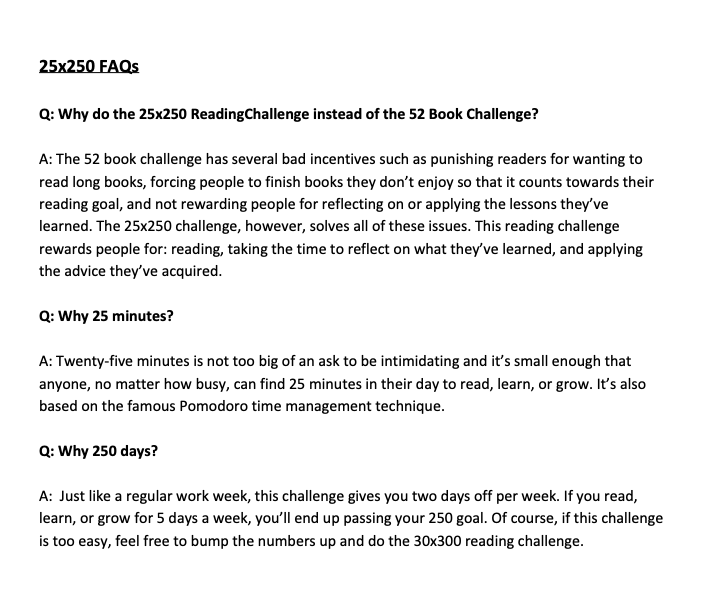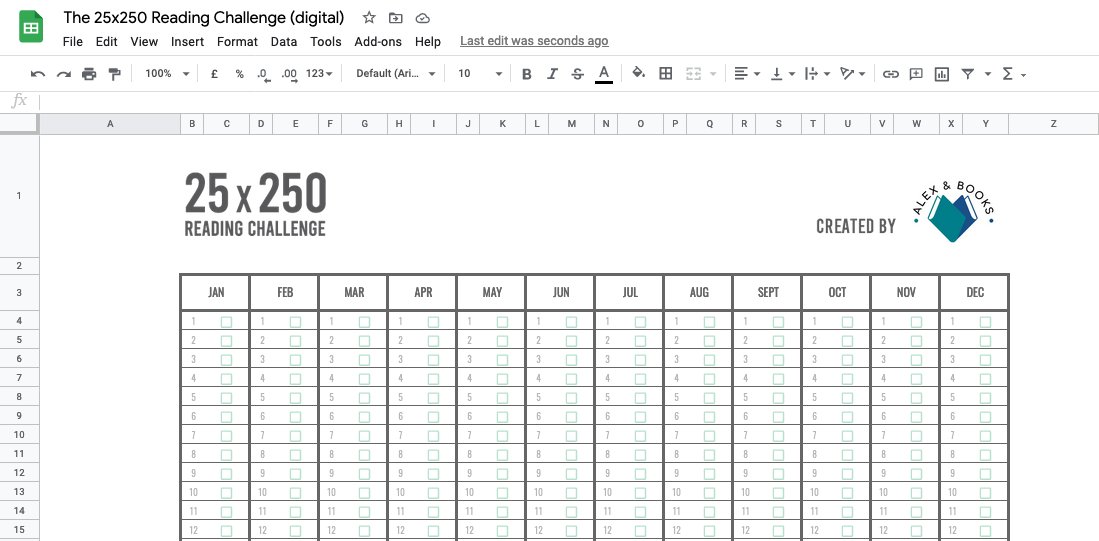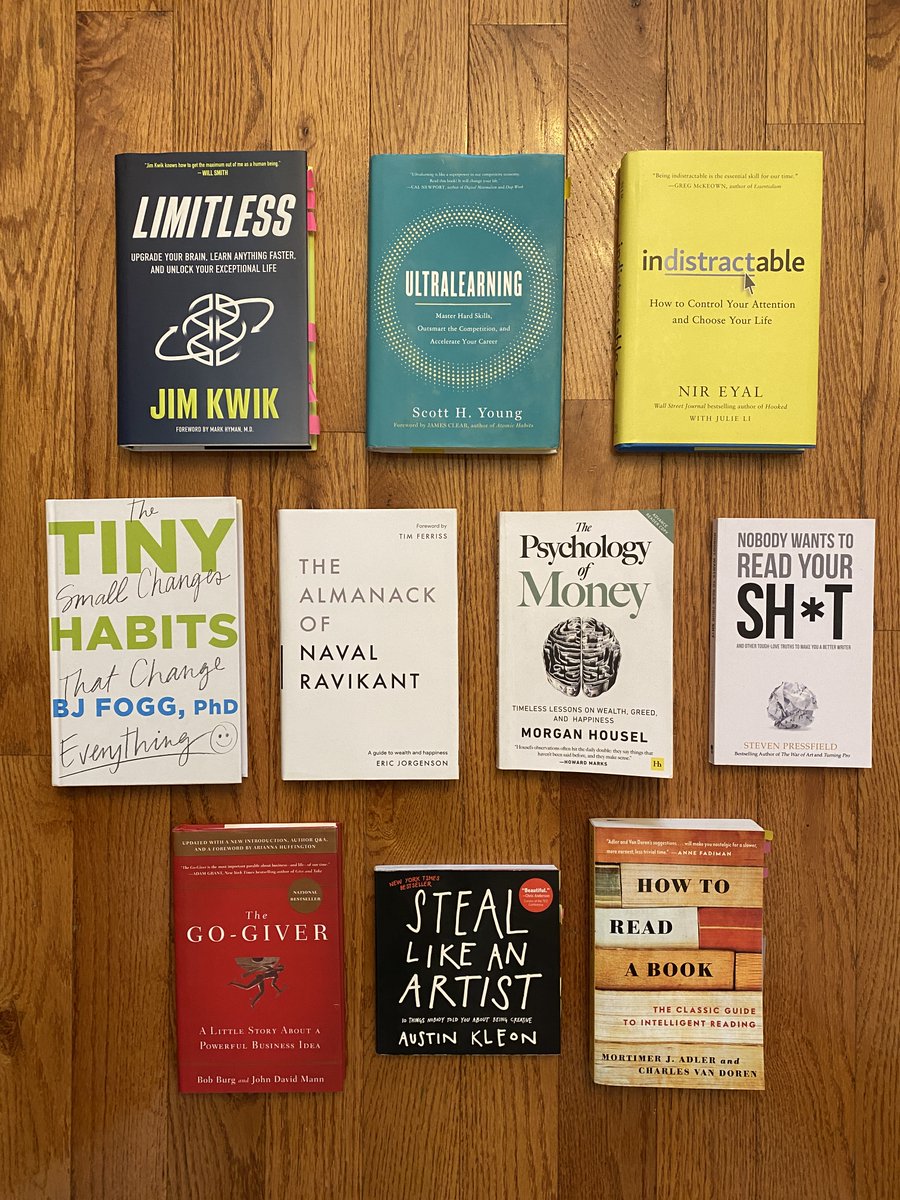
I really believe the 25x250 Reading Challenge is one of the best things I've created.
Here's why:
(thread) 🧵
[PS: scroll to the bottom for a FREE and UPDATED version of the reading challenge]
Here's why:
(thread) 🧵
[PS: scroll to the bottom for a FREE and UPDATED version of the reading challenge]
1/
As I mentioned before, the 52 Book challenge is flawed. It:
• Punishes readers for quitting books
• Punishes readers for picking long books
• Incentives quantity over quality reading
• Doesn't reward readers for reflecting or taking action on what they've learned
As I mentioned before, the 52 Book challenge is flawed. It:
• Punishes readers for quitting books
• Punishes readers for picking long books
• Incentives quantity over quality reading
• Doesn't reward readers for reflecting or taking action on what they've learned
2/
The 25x250 Reading Challenge solves all of these problems:
• It doesn't punish readers for quitting books
• Nor does it punish readers for picking long books
• It rewards readers for reflecting and taking action
• It encourages people to read BETTER, not just read more.
The 25x250 Reading Challenge solves all of these problems:
• It doesn't punish readers for quitting books
• Nor does it punish readers for picking long books
• It rewards readers for reflecting and taking action
• It encourages people to read BETTER, not just read more.
3/
The 25x250 allows you to track your reading progress every day.
Which turns it into a daily habit and something you want to keep on doing.
And you can also check your progress per day or per month simply by glancing at your worksheet.
The 25x250 allows you to track your reading progress every day.
Which turns it into a daily habit and something you want to keep on doing.
And you can also check your progress per day or per month simply by glancing at your worksheet.
4/
Now why did I pick 25 mins?
Spending 25 mins isn't too big of an ask to be intimidating and it's small enough that everyone, no matter how busy, can find time for.
It's also based on the famous Pomodoro technique. Everyone should be able to focus on a task for 25 mins.
Now why did I pick 25 mins?
Spending 25 mins isn't too big of an ask to be intimidating and it's small enough that everyone, no matter how busy, can find time for.
It's also based on the famous Pomodoro technique. Everyone should be able to focus on a task for 25 mins.
5/
Why did I pick 250 days?
Similar to the regular workday, you want to aim for 5 days of progress a week and you get 2 days off.
Reading, learning, or growing for 5 days a week for 52 weeks equals 260 days which surpasses the 250-day goal.
[more info in pic]
Why did I pick 250 days?
Similar to the regular workday, you want to aim for 5 days of progress a week and you get 2 days off.
Reading, learning, or growing for 5 days a week for 52 weeks equals 260 days which surpasses the 250-day goal.
[more info in pic]

6/
Now for the big news:
The 25x250 Reading Challenge worksheet has been updated with a new and cleaner design (shoutout to @CrawleyGraeme for the design help).
PS: If you want to track your progress more specifically, you can color-code your worksheet as I did.

Now for the big news:
The 25x250 Reading Challenge worksheet has been updated with a new and cleaner design (shoutout to @CrawleyGraeme for the design help).
PS: If you want to track your progress more specifically, you can color-code your worksheet as I did.


7/
AND...
There's also a digital version that automatically tracks your monthly and yearly progress.
Simply click on the day that you've spent reading, learning, or growing, and the monthly and yearly count will be updated.
(see pics for an example)


AND...
There's also a digital version that automatically tracks your monthly and yearly progress.
Simply click on the day that you've spent reading, learning, or growing, and the monthly and yearly count will be updated.
(see pics for an example)



8/
And the best part?
You can get both the print and digital worksheet for FREE.
850+ people have already downloaded their copy.
Get yours here:
gumroad.com/l/KchJc
And the best part?
You can get both the print and digital worksheet for FREE.
850+ people have already downloaded their copy.
Get yours here:
gumroad.com/l/KchJc
• • •
Missing some Tweet in this thread? You can try to
force a refresh






